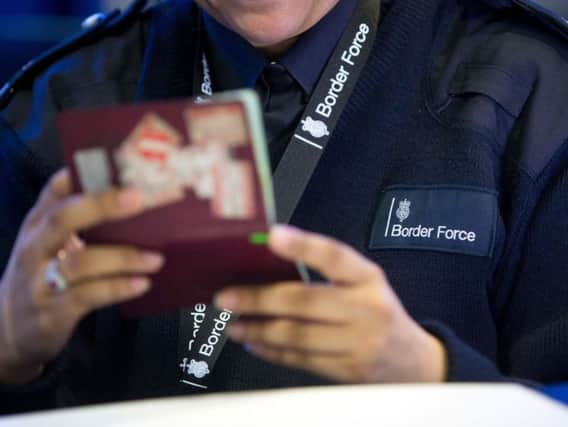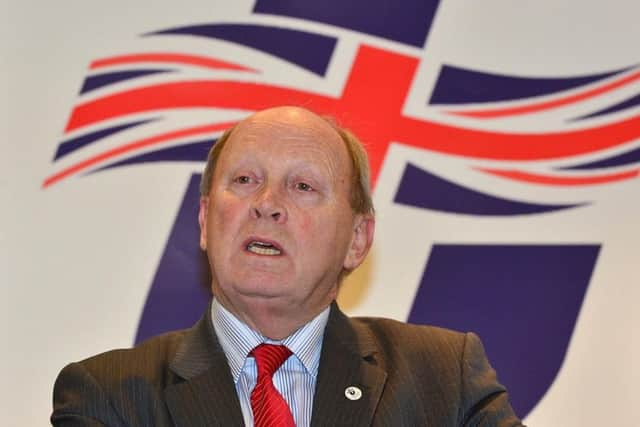Border Force hiring stance changed due to too many Protestants in security forces


The news has prompted fresh criticism of the Equality Commission, and a call for the whole hiring process to now be halted.
MLA Jim Allister – whose detailed reading of the job application criteria brought the issue to the fore in the first place – said the situation is “outrageous”, and “cannot be allowed to go unchallenged”.
Advertisement
Hide AdAdvertisement
Hide AdThe matter first emerged at the start of the week, when Mr Allister noticed that the hiring criteria for the 16 Border Force officer jobs now open in the Province is different to the criteria in Great Britain.


For both regions, applicants must either have the equivalent of two A Levels at grades A to E, or must formerly have served as a Border Force officer for two years.
The rules in Great Britain go on to state that even if applicants do not meet this criteria, they are still eligible to apply if they were formerly in the police or the military.
However, this rule only applies in England, Scotland, and Wales – not Northern Ireland.
Advertisement
Hide AdAdvertisement
Hide AdIn other words, a former policeman who does not have A Levels would be welcome to apply for a Border Force job in Great Britain, but is excluded from applying for the same job in Northern Ireland.
Since the start of the week, the News Letter has been asking the Home Office – which the Border Force is part of – why this difference exists.
Four days after it was asked, it told the News Letter: “The Equality Commission for Northern Ireland raised concerns about using military and law enforcement as a specific criteria because this could disadvantage those from a particular community background within Northern Ireland. This requirement was therefore removed by Border Force for this campaign in the interest of ensuring we have a representative profile of candidates.”
It is understood lawyers had advised that potential Catholic applicants without police/military backgrounds could argue that the proportion of Protestants who do have such backgrounds is significantly higher.
Advertisement
Hide AdAdvertisement
Hide AdThe Equality Commission said it had “stressed the importance of ensuring that employers in Northern Ireland comply with the requirements placed on them by the equality legislation here” to the Border Force.
It also cited “concerns in relation to the relevance of the experience criteria”, since training would be provided to new recruits upon joining.
It said the matter had been brought to its attention by Committee on the Administration of Justice – a Northern Irish campaign group which describes itself as striving for “a new society based on human rights and the rule of law”.
The closing date for applications is Monday.
Jim Allister, TUV leader and qualified barrister, said: “It is imperative that the recruitment process is halted now and that posts in Northern Ireland are open to applicants on the same basis as the rest of the UK.”
Advertisement
Hide AdAdvertisement
Hide AdEx-DUP MLA Jimmy Spratt joined the RUC in 1972, and retired from the police in 2002.
He said the Border Force is cutting itself off from a pool of people with highly-relevant experience, and dubbed the situation is “absolutely crazy”, “just unbelievable”, “nonsensical”, and “beggars belief”.
“It should be the best person for the job at the end of the day,” he told the News Letter.
“It’s just more discrimination being heaped on by the so-called Equality Commission.”
Advertisement
Hide AdAdvertisement
Hide AdHe added the rules “absolutely, 100%” amount to discrimination against the Protestant community at large.
Mr Spratt went on to say the historic imbalance in the make-up of the security services was down to republicans intimidating Catholic personnel in their own communities, and that the police have since undergone a period of “50-50” recruitment to redress Catholic under-represenation.
SECOND CONTROVERSY WITHIN WEEKS ABOUT SAME ADVERTS:
The row above, centring on applicants who have security force backgrounds, is the second time within weeks that a controversy has erupted over the same job adverts.
Just over a fortnight earlier, there had been an outcry from nationalist quarters about the requirement for job applicants to have “a full and valid British passport”.
Advertisement
Hide AdAdvertisement
Hide AdA statement from the SDLP MLA Claire Hanna described it as “a scandal that Irish passport users would be prevent for (sic) applying for jobs”.
Meanwhile a statement from Sinn Fein’s Conor Murphy MLA said this passport requirement amounted to “naked discrimination of a public sector position”.
It also said that the very fact there is a recruitment drive at all for what it termed the “British Border Force” shows the UK government is “clearly planning to impose their hard Brexit border across the island of Ireland”.
The Equality Commission – which is perhaps best known for having supported gay campaigner Gareth Lee in bringing his court case against the Christian proprietors of baking firm Ashers – also added its voice to the calls for the criteria to be changed.
Advertisement
Hide AdAdvertisement
Hide AdIt said that it had been in touch with Border Force and “made the point that the requirement for a person to hold, and produce at interview, a British passport in order to meet the criterion of being a UK national, could exclude a large section of the Northern Ireland population who identify as Irish, hold no UK passport and, in many cases, hold an Irish passport”.
This could lead to possible breaches of the Fair Employment and Treatment Order, adding that the Border Force must give consideration “to article 1(vi) of the Belfast/Good Friday Agreement, which recognises the right of all the people of Northern Ireland to identify themselves and be accepted as Irish or British, or both”.
The Home Office later said the requirement to hold a British passport had been an “error”.
Instead, the criteria for the jobs – both in Great Britain and Northern Ireland – was altered to make no mention of British passports.
It says only that a valid passport is needed, without specifying which kind, and that applicants should also be able to show evidence of UK nationality.